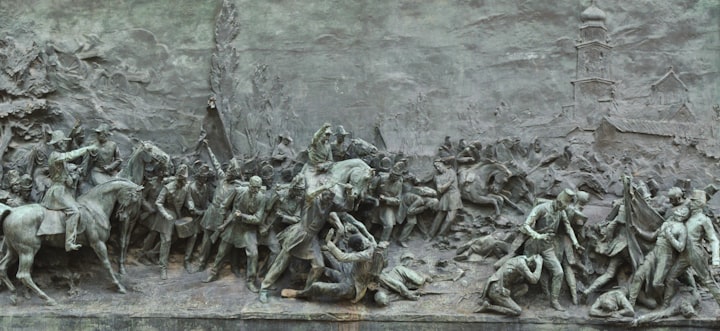To Arm or Not to Arm, that´s the Question Here
Arms Races in International Politics
You don't want to face an enemy without a weapon, right? If you can't run from aggression, at least you want to defend yourself. If the guy has a knife, you better have a gun. If he got rockets, you better have nukes. While the individual's strive for security is comprehensible, the interactive impact is that of an arms race that reduces security for both parties, at least if intentions are not generally aggressive. In international relations theories, the discussion about arms races mirrors general assumptions about how states interact. Unfortunately, both strategies, matching an enemy by armament and delaying armament to prevent a war, may lead to what it intends to avoid: a war. The buildup of the two World Wars shows this drastically.
Let's be realistic: A power vacuum invites intervention
The realist paradigm in international relations posits a system defined by anarchy, where no overarching authority exists above states. In such a system, states are primary actors driven by self-interest, seeking power to ensure their survival. This results in a security dilemma, a state of anarchy in which you can get crushed at any time. And this security dilemma is Hobbesian, Homo homini lupus, the Man is Wolf to Man. In short, Humans are bad. Very unpleasant, indeed.
Offensive realists assume that states generally are expansionist, as control of territory for them equals enhanced capabilities, and capabilities mean power. And power equals security. The effect is that somebody will be rarin' to go whenever a vacuum develops. Even when a state builds up its military purely for defensive purposes, other states might perceive this buildup as a threat, as the other state COULD attack. The potential is enough. As a result, the other state will increase military expenditure in response. This reactive sequence causes a spiraling effect, with each state's quest for security paradoxically making all participants less secure. And it is pretty difficult to escape this trap.
Nope! It's how you perceive it!
While realism emphasizes power and self-interest, constructivism underscores the importance of perceptions, identities, and ideas. And these may vary from human to human, from state to state. Alexander Wendt famously asked why – in the West – we are afraid of an Iranian nuke but not of a French one. It is rather obvious: we do not perceive France as a threat, but we do so with Iran.
Arms races can develop because of misperceptions or misunderstandings. For instance, one state's development of a new weapon system might be intended as a deterrent or even a purely defensive measure. Still, others could misinterpret it as an offensive move. Such misperceptions, rooted in the historical context, pre-existing rivalries, and shared struggles, or purely in propaganda, can exacerbate tensions and stimulate arms races.
What about creating a higher authority?
Liberals argue that international institutions, like the United Nations or the European Union, can dampen or prevent arms races. These institutions provide a platform for communication, dialogue, and building up trust among nations, with the potential for mitigating the security dilemma. In this more Kantian perception of the security dilemma, these institutions serve as the "higher authority" that realists neglect.
Re-shuffling the International System
One of the most significant concerns about arms races – underpinned by real-world events – is the potential to escalate conflicts. As states become more militarily powerful, the stakes of any potential confrontation rise, no matter whether the threat is real or only perceived. As more resources are poured into arms, the cost of not using them, or the temptation to use them pre-emptively, may increase. Cynically, one could say that this is like letting a child build a model railway but not allowing it to run the trains. Be aware of military circles that may push for conflict during a crisis.
Arms may play a role in any crisis, even economic turmoil. Arms races often divert substantial national resources from other sectors like education, healthcare, or infrastructure, negatively impacting welfare systems crucial for political stability. The economic burden of sustained military buildup can lead to internal economic downturn, especially in states with limited resources.
And then there is the problem of proliferation. Arms races, especially in the nuclear realm, can spread advanced weapon systems to more countries. This proliferation makes the international system more complex and potentially more volatile, as more actors possess the means to cause significant harm. And being immune against attack makes it easier for you to attack others, as the case of the Russian war in Ukraine shows. Nobody attacks Russia in retaliation because they have nukes.
Arms Races Leading to World Wars: A Historical Flashback
Arms races always took place throughout history: Between Athens and Sparta in ancient Greece, during the era of building fortifications in the Middle Ages, or the nuclear arms race during the Cold War. In the future, arms races may center around the military use of space or Artificial Intelligence. I want to highlight two arms races before world wars: Between the UK and Germany before World War I and the asymmetrical arms race before World War II. Here, the one-sided armament of Nazi Germany was not matched by Britain, which instead engaged in a politics of appeasement.

The naval arms race before World War I
The period leading up to World War I saw challenges to the power equilibrium of the Westphalian Peace System. A fierce naval arms race between Britain, the world's preeminent naval power, and Germany, an ambitious rising power, broke out. The establishment of the German Reich during the Franco-German War of 1870/71 catapulted Berlin to become the dominant continental power. Around 1900, Germany superseded Britain in industrial production. France, the old continental balancer, did not match German economic might and military power at all.
We have conquered for ourselves a place in the sun. It will now be my task to see to it that this place in the sun remains our undisputed possession, for our future lies upon the water (Emperor Wilhelm II)
Based on a strongly militarized culture, Germany changed its foreign policy considerably after the demise of long-term chancellor Bismarck. Emperor William II, contrary to Bismarck, saw the country as a latecomer on the colonial scene and demanded "a place at the sun" (ein Platz an der Sonne). In its colonial ambition, Germany directly clashed with Britain. The confrontation, of course, was based on naval issues, as ships are what you need to sustain a colonial empire.
Germany's pursuit of a fleet to rival Britain's Royal Navy was encapsulated in the 1890s and early 1900s Naval Laws and followed the Tirpitz plan as a strategic game. The idea of Admiral Tirpitz: Build as many ships as necessary to inflict severe losses on the British Navy in case of conflict so that Britain would avoid a war. Following this blueprint, the German navy rose to 60% of the British Navy's size and became the world's second-biggest fleet.
What Tirpitz labeled as "risk theory" had unintended effects. Britain responded by constructing revolutionary battleships, prompting Germany to build its equivalents. But even more seriously, the threat opposed by Germany initiated British alliance-building. The Entente with France, later widened with Russia to form the Entente Mondial, led to an encirclement of Germany, weakening the country's strategic position in the international system. Germany reacted by establishing the Triple Alliance with Austria-Hungary and Italy. The setup of World War I was established, and it took only a bullet out of the gun of a Serb nationalist to trigger the war.
Appeasement and delayed armament before World War II
The Treaty of Versailles imposed strict disarmament conditions on Germany after World War I. However, under Adolf Hitler's extremist leadership in the 1930s, Germany began covertly, and then overtly, violating these conditions by rearming and expanding its military. The rapid militarization included the establishment of the Luftwaffe (air force), the expansion of the army, and the development of a modern navy.
Britain and France, traumatized by the First World War and amid economic struggles, initially followed a policy of appeasement towards Nazi Germany's breaches of the Treaty of Versailles. They allowed Germany to remilitarize the Rhineland and annex Austria and the Sudetenland. Each act of appeasement sent a message to Hitler, leading him to believe that the Western powers would not oppose further expansion – just because they could not resist militarily. It was only when Germany invaded Poland in 1939 that Britain and France declared war, marking the beginning of World War II. Here, the two Western countries started from a suboptimal position, as only after the Munich Conference (1938) did the UK lose the illusion of perpetual peace.
In Asia, the situation was similar. An aggressive rising power, Japan, was rapidly expanding its military capabilities. Japan's invasion of Manchuria and later China and the country's neglect of collective security institutions (League of Nations) directly threatened the global ambitions of powers like Britain and France, but also the US. When the US finally reacted to Japanese aggression by imposing sanctions cutting Japan's access to oil, Nippon attacked Pearl Harbor. It took the US a long time to rearm itself to become a match to Japan, and Britain and France were bound in Europe.

To Race or not to Race, that's the Question here
The arms races that preceded the two World Wars were not mere accumulations of deadly weaponry but deeply intertwined with the political and strategic imperatives of the time. They amplified mutual suspicions, led to alliance formations, and propelled the stakes of the conflicts. In the case of World War I, the arms race expanded a regional conflict into a global one, a trench warfare unprecedented in history. In the lead-up to World War II, the arms race, combined with appeasement and strategic miscalculations, pushed the world into a devastating six-year war. Ironically, in the buildup of World War II, the fact that the UK and the US delayed entering an arms race with Germany and Japan allowed these countries' expansion. The consequence is sad: if we engage in an arms race, it may lead to war, but if we delay, it may lead to the same result.
About the Creator
Jurgen Dieringer
J Dieringer is a professor of international relations by profession and a musician, writer, and chess player by passion. He strives to merge those inputs and tackle the intersection of arts and science.







Comments
There are no comments for this story
Be the first to respond and start the conversation.